Have you ever wondered how you can move on from someone you never dated? Perhaps you’ve been pining for them for months (or even years) . . . hoping they’ll finally notice you and see your value.
This great question is one of 7 I answer in today’s new video, based on the comments you left me last week. I also dig into topics like:
- What’s the best way to start a long-distance relationship?
- What’s your dating advice for people over 40?
- Why did they change their mind about being ready for a relationship?
Don’t miss these, and once you’re done, be sure to leave a comment with a question you’d like me to answer next time!
Hello, everyone. Welcome back to the channel. I am Matthew Hussey, a coach specializing in confidence and relational intelligence, and I’m widely known for helping people find love. Last week, I answered a whole bunch of questions that you had sent in and left in the comments, and we thought we’d do a Part 2 of that video by having me do the same thing this week.
Before we get into the video, I would really appreciate if you would like this video, subscribe to the channel, and hit the notification bell, so that you do not miss the next video when it comes out.
Also, I made a commitment a long time ago to deliver free content for everybody on an ongoing basis. And one of the places I do that, in addition to this YouTube channel, is my ongoing newsletter where I am sending out a free newsletter full of advice, practical wisdom, and ideas that could help you find love or heal from lost love every Friday. And many of you have already signed up. It’s completely free. So, if you haven’t already, it’s at The3Relationships.com.
Kelly says, “What are your top tips to starting a long-distance relationship?”
Firstly, be very careful about when you start calling it a relationship. There’s nothing wrong with meeting someone online, through the apps, someone long distance, and having this fun, flirtatious connection that starts to build. But in that time period, it probably isn’t the right thing to call it a relationship unless you’ve explicitly had that conversation. But it would be strange if you had it too soon. It could even be a red flag if someone is saying that to you too soon. But after a certain period, when you have that desire to start calling it a relationship, don’t let the desire turn into a reality in your mind that you’re now in a relationship when the two of you have never actually had that conversation.
Over the years, I’ve watched many, many hundreds of people give to this situation like it’s a relationship—be exclusive, give time, give energy, give effort, make trips—when the other person is not behaving like they’re in a relationship at all. And they never really had that conversation. It just became this assumption.
If you feel you’re in a relationship, I would start by having the conversation, so that you’re both on the same terms: “Hey, do we both feel the same way? For me to continue giving to this, it would have to be on the basis that we’re really giving this a try as a relationship, and that it’s an exclusive one.”
And once you’ve set the ground rules for that—okay, both of you have said yes to that. Now, you’re in a long-distance relationship. And at that point, it becomes: How do we navigate the difficulty of something that feels wholly unnatural, which is, we’re trying to have an intimate relationship at a geographical distance?
Well, firstly, there has to be a time on the horizon where you know you’re going to see each other. You’ve got to have something to look forward to. And as the relationship progresses, I would argue that there needs to be some kind of a vision for how you’re going to solve that issue in a sustainable way. What does this look like in a year, in two years? Are we actually going to be in the same place?
That doesn’t have to happen on Day 1, but there does gradually start to have to be a vision for: How does this problem get solved? Otherwise, we’re in a relationship where neither of us are actually taking on the reality that we haven’t solved it, and maybe we haven’t solved it because neither one of us is actually willing to do what it takes to permanently solve this situation.
In the meantime, when you’re trying to navigate it, I would say mixing up the energy that we bring to the table. It’s very easy for us to say, “I am long distance, so the kind of energy I give when I’m in the same room as someone, especially romantically, is off the table. Instead, I’m just going to do what I can do, which is to have very long in-depth conversations.”
But if you think of any relationship where all it is, is one note of very long, in-depth conversations, eventually, it’s going to get boring. It’s going to get stale. It’s going to feel staid.
So, we have to mix up our energy. Are you being flirtatious? Are you still bringing your sexuality to the table, obviously, in ways that feel safe to you? Sending nudes and things like that represent real challenges and risks when it comes to potentially breaking up with someone or someone you can’t trust. That’s a whole different subject. But we’re talking about still bringing your sexual energy to the table, still bringing your playful energy to the table.
Can you have a 60-second funny voice note or call AND three hours spending the evening together, talking for that long? Can you be both?
The last thing I’ll say about this is: there’s being together in conversation and there’s being together in company. When you think about a relationship, sometimes you’re having conversation, and that’s quality time. Other times, you’re just in company with someone. You’re sitting next to each other on a sofa, reading books or watching a movie. It would be hard work if quality time always meant being in conversation.
If someone learns that the only way to connect with you is to have conversations with you, they’re going to start to feel the stakes are really high any time they want to be with you or around you, because it’s going to involve trying to have a conversation, and at a certain point, you will run out of things to talk about. That’s just natural.
So it might be time to be in company with them. That might mean hitting play on a movie at the same time from a long distance and watching a movie together. And then talking about the movie afterward. Don’t just be in conversation. Pick times to be in company, and that will lower the stakes for the time that you spend together. It also means that time spent together doesn’t always have to mean time away from other obligations and responsibilities that both of you have.
Glori says, “Do you see a connection between the physical pain you endured and the newfound level of love and vulnerability you orient from?”
Well, firstly, that’s a lovely compliment. Thank you. For those of you who don’t know, I write in my new book, Love Life, about my own journey with physical chronic pain, and how it lasted for many years. Part of that I still have, so it hasn’t completely gone away. It certainly did kind of crack me open. I think every challenge we have, every challenge I’ve ever had in life, has been an invitation to a greater degree of compassion, not just for myself, but for other people. I think every time we go through a challenge, we get more connected to what other people go through in life if we can widen our lens and not just see it as our pain. Because of course, none of our pain is original. Other people have experienced it—are experiencing it.
I always find that any challenge gives me a window into the challenges that other people have faced or are facing. That’s made me a more compassionate, loving, humble person every single time. My chronic pain was, I suppose, in some ways, my first encounter with something that truly made me miserable that I didn’t know how to change. I didn’t know how to make it go away. And I had to change my relationship with it. That was one of the most humbling experiences of my entire life. It was also, in many ways—and I’m not someone who throws this word around lightly—it was a spiritual experience to come to a place of acceptance with that.
So, yes. I don’t think it’s the only thing that’s made me loving and vulnerable, but I do think it gave me access to a depth that I hadn’t had access to before when I felt like I could always fix my problems. In this case, I couldn’t fix it. I had to change the impact it was having on me by changing my relationship with the challenge itself.
Marie says, “Why am I so obsessed with looking for things wrong in my relationships? Things that will hurt my heart, like looking at their exes on social media and then overanalyzing everything.”
So, on one hand, it might be that there’s a familiarity for you in looking for those kinds of things—that simply sitting back and enjoying the peace you might feel right now is deeply uncomfortable and unfamiliar, which is why it’s uncomfortable. Instead, going and looking for something that creates drama gives you something to feel jealous about, gives you something to feel insecure about. It’s much more familiar. And we’re drawn to what’s familiar—not necessarily to what makes us happy.
I want you to imagine that so far in life, your behavior in dating has been like an old vinyl record. And the groove in that vinyl that plays the song a certain way has been long since established.
So when you go on another date or when you start seeing someone you like, what happens is you put the needle on that record, and that record starts to play, because it’s the groove you established a long time ago.
You don’t necessarily have access to a different record to play right now, because you haven’t established those grooves. But you can. It requires conscious practice. It requires an awareness of, “Oh, I’m going to look at this person’s profile right now and dig deep into who they’ve been with before, or what their exes are like, or what they have that I don’t” as a kind of compulsion, because that’s the record I’ve been used to playing. I’m used to feeling these feelings of jealousy, of anxiety, of tension. I’m not used to not doing that and feeling a sense of peace.
But if I become aware as I’m about to do it—that that’s a behavior I feel drawn to not because they’re doing anything underhanded or behaving badly or giving me reasons to be suspicious, but because that’s the way the record plays for me. That’s the groove I’ve worn in over time.
When we get conscious of that, we become able to take a different path. And it may be that that path in the past served a need, maybe the need to feel safe, and as a result, that hypervigilance that’s had you looking for problems so you can go and meet them (instead of them surprising you) is something that’s made you feel safe. It’s felt like a form of control. But maybe these days, you’re ready to accomplish a feeling of safety in a new and more productive way—for example, in just having trust in yourself, that if anything were to come to light that would reveal this person wasn’t a good partner, you would be able to walk away, which means you don’t need to anticipate every problem.
You just need to show up as the best version of you and pay attention to the present and to what you’re actually seeing from this person, not trying to anticipate everything they could be or do in the future.
Grizle says, “I would love to hear more tips and advice for dating in our 40s and 50s. Everything seems to be targeted toward the younger generation. Why is it so hard to find love again, and what can we do to become our best self to attract a partner?”
Look, I have always maintained that the things I say are applicable at every age. I don’t think that, even when I’m talking about things like flirting, often people think, “Oh, you’re talking to younger people there.”
But of course, what makes us attractive at any age is the ability to both be sincere, but also be playful—the ability to be flirtatious, to not lose that energy.
I would challenge you to ask yourself: “What is the part of what Matthew is saying that I don’t think applies beyond a certain age?” Because I think the fundamentals apply at any age. If you’re in your 50s and you have come out of a long-term relationship or a divorce, or perhaps you’ve just struggled to meet someone in your life, the fundamentals are the same: How active is our life? Is it the kind of life that brings us into contact with other people?
A lot of the time, the older we get, the more our life contracts. We get into these routines and rhythms that can become quite staid. They’re very comfortable to us, but they may not be the kinds of routines that actually engage us socially with people we don’t already know.
Do our lives include communities, environments, events that bring us into contact with new people? Are we being brave in those areas? Because it does require some bravery. It’s hard.
The last thing I would ever tell you is that it’s easy, because the reality is, many people do experience feeling more invisible, feeling like they don’t have nearly the same amount of attention they had at a different stage of their life.
I think for that reason, we have to find ways of enjoying the process, because otherwise, we’ll never do the things that bring us into contact with opportunity. What are the activities that I might like to do regardless of whether I meet someone . . . but by doing those activities, I might actually meet someone? What other ways I could engineer my life to build myself into more new communities where I could meet new single friends? Where I could meet different types of people than maybe I’ve encountered in the past by not over-relying on only one thing, like a dating app?
You know, it’s very tempting to get into the comfort of a dating app. But then it can be very demoralizing when we find we’re not getting matches, or the kinds of people that are matching with us are sleazy or they’re not our type of person or they’re scamming us, which is very common these days. It can be extremely demoralizing, which is why I say you can do those things, but don’t make it your only source of new people in your life. That’s what we do, again, from a place of comfort and not actually putting ourselves out there in the real world.
I do empathize with what you’re feeling and what you’re going through. It’s hard when we’re not where we want to be at a certain stage in our life, and we feel like it’s gotten harder in the process. But I also want you to entertain the idea that at least a part of that is—not all of it, because some of that difficulty is real—but at least a part of it may be a story we’re telling ourselves about how it’s impossible, it’s never going to happen, or no one is ever going to want us. Instead, consider the idea that if you just woke up into your body right now at the age you are, and you felt the desire to meet someone without any of the baggage of the past, you might take a different approach and have a different energy toward going out there and meeting someone. And that energy might be the reason you do meet someone.
Min says, “How to move on from someone you have never dated? Feelings for him are so strong that it feels like something is dying inside.”
I’ve spoken about this at length in my book, Love Life. For anyone who hasn’t got a copy, I strongly advise that you read Chapter 2: “How to Tell Love Stories.” Because in it, I talk about the value we’re often placing on the wrong things—that a real relationship is so much more than the story we invent about how important a person is.
I have a much more backward-looking approach for relationships than forward-looking. In other words, a forward-looking approach is: Look at all the potential for this person. Look at all the potential for how happy they would make me. Look at what we could be together. And that is, by definition, a projection of a future that does not exist. So we could be right, I guess, but we’re only right if that future that we’ve anticipated actually happens. If it doesn’t happen, then we were wrong about how important this person was.
Whereas a backward-looking approach is saying: “Look at how extraordinary this person is who is in my life—all the ways they have shown up for me. Look at what we’ve built together. Wow, this is an important relationship. Wow, this is an important person in my life.”
And you don’t need your imagination for that exercise. You’re saying it because it’s true, because those are the facts, and I would argue that in order for you to feel like something is dying inside right now, you need a lot of imagination, because there’s an imagined idea of how important this person is in your life when they’re not living up to that idea at all, or the two of you would actually be in a thoroughly-fulfilling relationship with each other.
Once you realize that your pain is not actually coming from the importance of this person, but from the importance of the story in your mind, you can start to see that story for what it is—a story—and separate from it and observe it, the same way we do with our thoughts and mindfulness practices. And start to realize that the story is making it painful, not the reality.
Ana says, “Why was a guy telling me from the beginning that he wants something serious with me, and after two and a half months, all of a sudden, he said he is not ready for a relationship?”
Well, there could be many reasons for that. Maybe he got overexcited in the beginning and couldn’t back it up. It might be that he himself got excited about the possibility of a relationship, but the reality of a relationship was something he wasn’t really ready for. In which case, after two and a half months, he did you a giant favor, because it’s better that you learn that fact two and a half months in rather than a year in.
That’s the case for a lot of people: They get excited in the beginning—and it’s a sign of real immaturity. It can also be a sign of manipulation. Of course, their perspective is: “I tell you I want something serious even when I don’t, because I just want to get something from you.” But like I said, it can also be a sign of immaturity: “I feel so strongly. I’ve never felt like this. I haven’t felt like this in such a long time. You make me feel amazing. I want something serious with you.”
Especially if he felt like you would only be into him if he wanted something serious, and maybe felt you’d pull away a little bit. And he was like, “No, no, no. I want something serious with you. I can’t lose you.”
There’s an immaturity to that if the reality is he’s not available for a real relationship when it comes down to it. He starts noticing that a real relationship means that he actually has to get to know you, not just your projection. He has to be known. He has to actually share more about himself instead of just being the heroic version of himself.
When someone is immature about love and isn’t ready for an actual relationship, just a feeling of a relationship . . . they may initially get excited and then when those things start presenting themselves, when having a relationship actually requires a few calories, all of a sudden, they get completely overwhelmed by the reality of a relationship. And it sounds like two and a half months in, either he had been in manipulation mode or he had been very immature about his version of love or his idea of love. And he couldn’t then back that up when the reality of a relationship presented itself.
The other alternative is that during those two and a half months, he discovered that it wasn’t right for him, for whatever reason. That doesn’t mean it has anything to do with you. There can be many, many reasons why something isn’t right for someone that aren’t to do with you. And it was easier to tell you that it turns out, he wasn’t ready for a relationship, and to tell you he didn’t want a relationship with you.
The important thing for you to realize is that someone has made their intentions clear. All you need to do is look at the situation and go, “Is there anything I would like to do differently next time? Did I bring my best self to the table?” And if the answer is, “No, I didn’t. I’d like to do some things differently next time,” then this was a gift in giving you that insight. And if the answer is, “No, I brought my best to the table. This person just misled me about their intentions for a relationship or decided I wasn’t right for that relationship,” then you need to grieve the disappointment and keep moving forward, because the right person for you will last longer than two and a half months.
And Ana, if you haven’t already, I would suggest that you go and check out Dating With Results. It’s a free training that I put together to help you seek out healthy, mature people who are ready for a real relationship, avoid the people who are not, see the early warning signs that someone is not, and have the conversations along the way that actually lead to something real.
For anyone out there dating right now, if you want to date productively, if you don’t want to waste your time, if you want to find the kind of love you’ve always been looking for instead of just more casual dating or something that presents as very exciting but then disappears as quickly as it came, this will be one of the most valuable hours you could spend for your love life. And it’s free.
All right. There seems to be one more question. This one is from Audrey Hussey, who asks: “Who is more tidy, you or me?”
It’s definitely me. I don’t—she thinks that she’s more—she has a strange perception of herself as a more tidy person. What makes you think you’re more tidy?
AUDREY HUSSEY
I tidy up more than you do.
MATTHEW HUSSEY
No, you don’t.
AUDREY HUSSEY
I do.
MATTHEW HUSSEY
I’m way more—I do way more to—do I? I don’t want to say anything that isn’t true. I’m always tidying up after you. In our bathroom, your makeup is always everywhere. And I always put it back in the bag and put it there because every time we have a nice, clean bathroom, and your makeup is just—you just leave it out. Do you think it just magically goes back in the bag? Do you think you have a magic makeup bag?
AUDREY HUSSEY
You’re my magic makeup bag.
MATTHEW HUSSEY
You’re right. I’m your magic makeup bag. There you have it, folks. She’s not untidy. But I do more to tidy up after you than you do to tidy up after me. And that is a fact. And you could ask anyone, literally, anyone.
JEREMY
Yeah, but there’s a difference between who tidies up as they go, versus letting it all pile up . . .
AUDREY HUSSEY
You may do the makeup; I do everything else.
MATTHEW HUSSEY
Whose side are you on, Jeremy? Why are you defending this? (laughs)
Well, join us sometime in the future when we do this again, and Audrey uses this very public forum to air out her own personal grievances with me.
Leave us a comment, so that I can read them, because I like reading your comments on our videos. And I will see you soon.
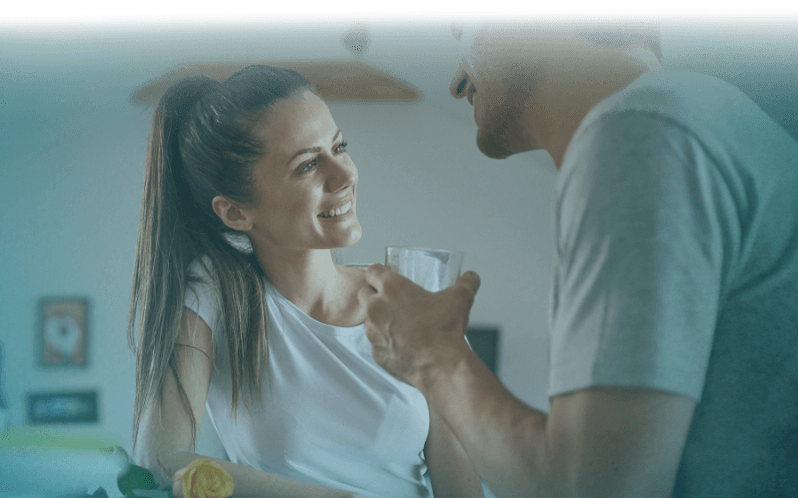
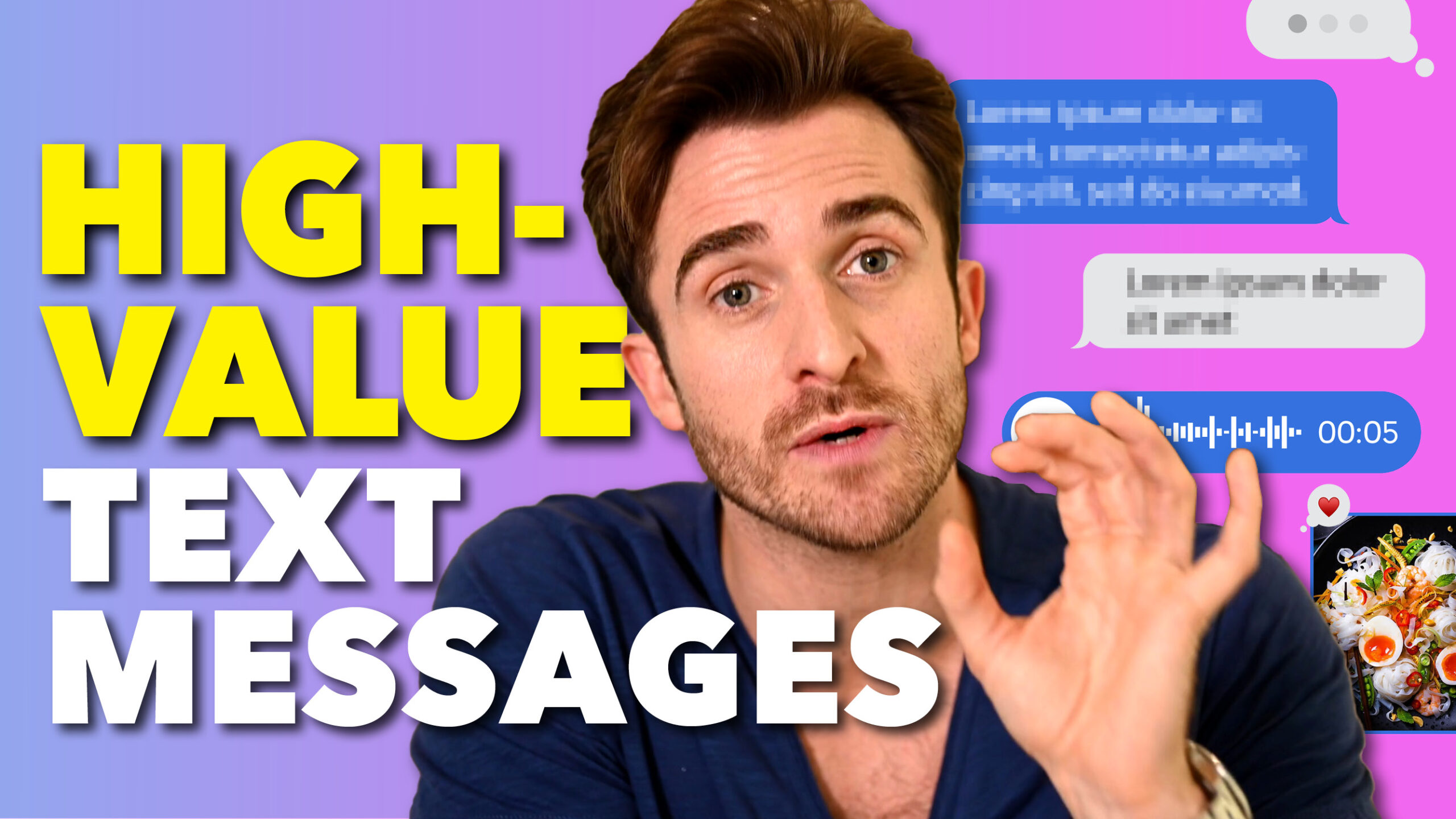



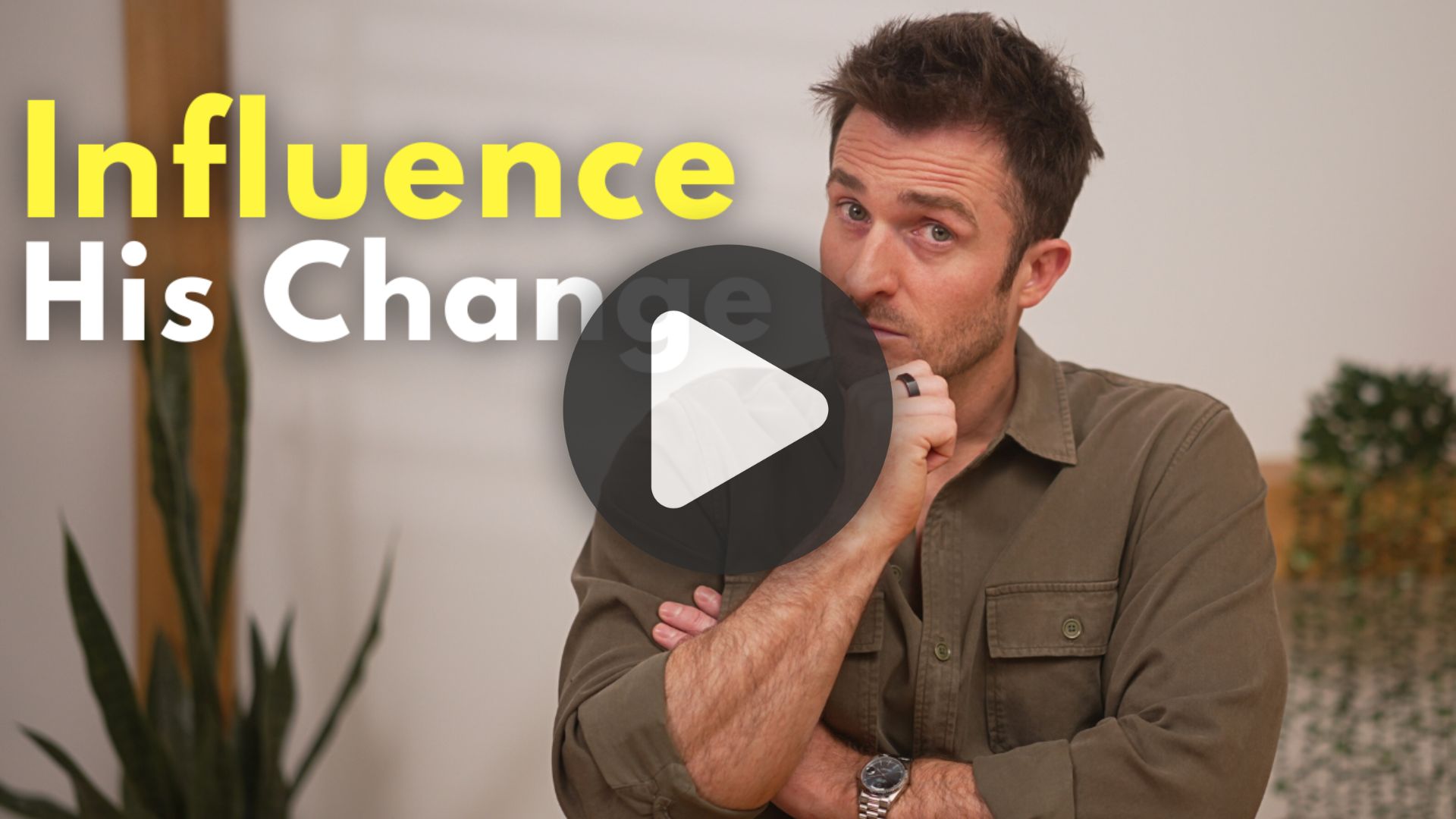
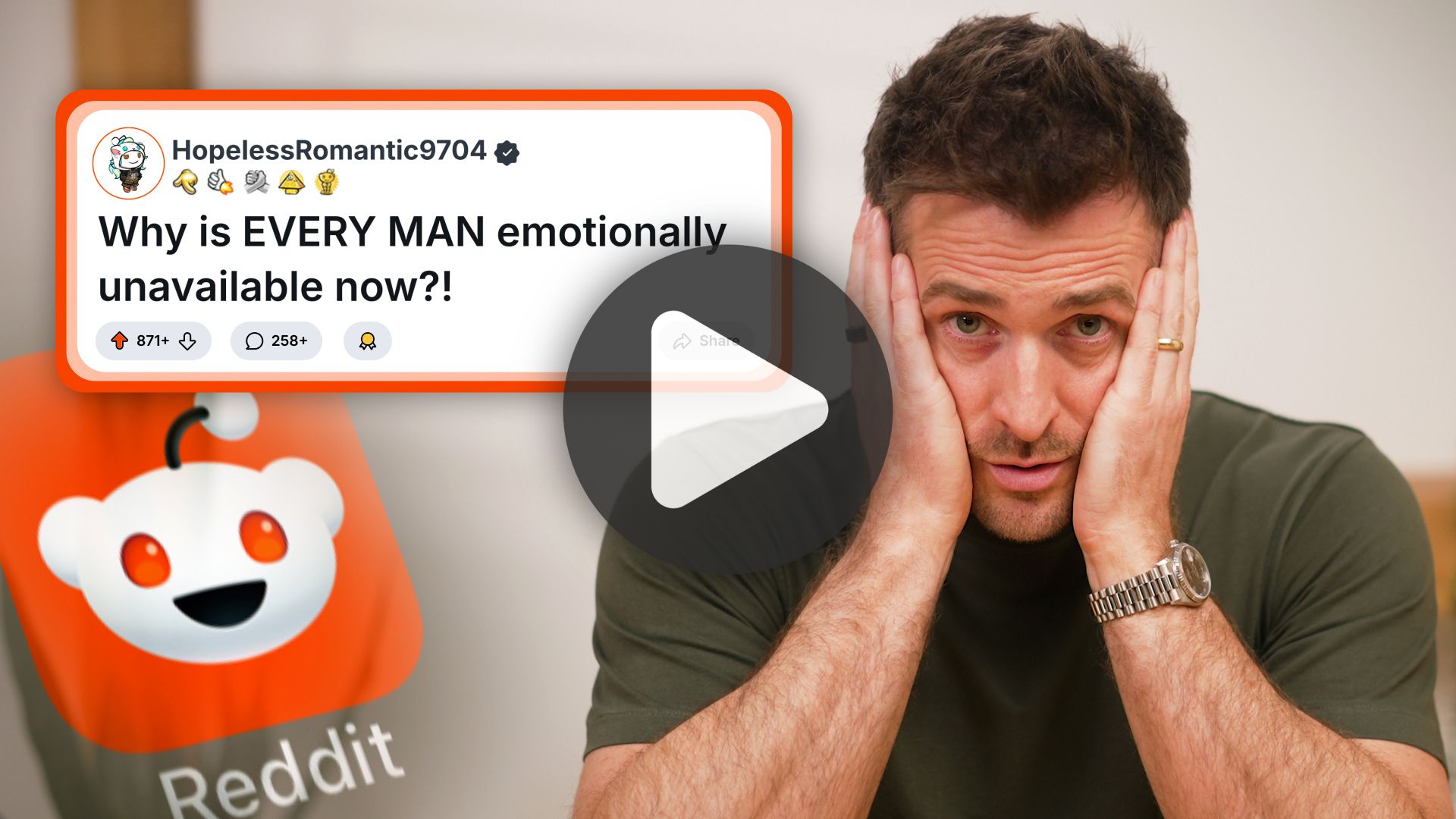
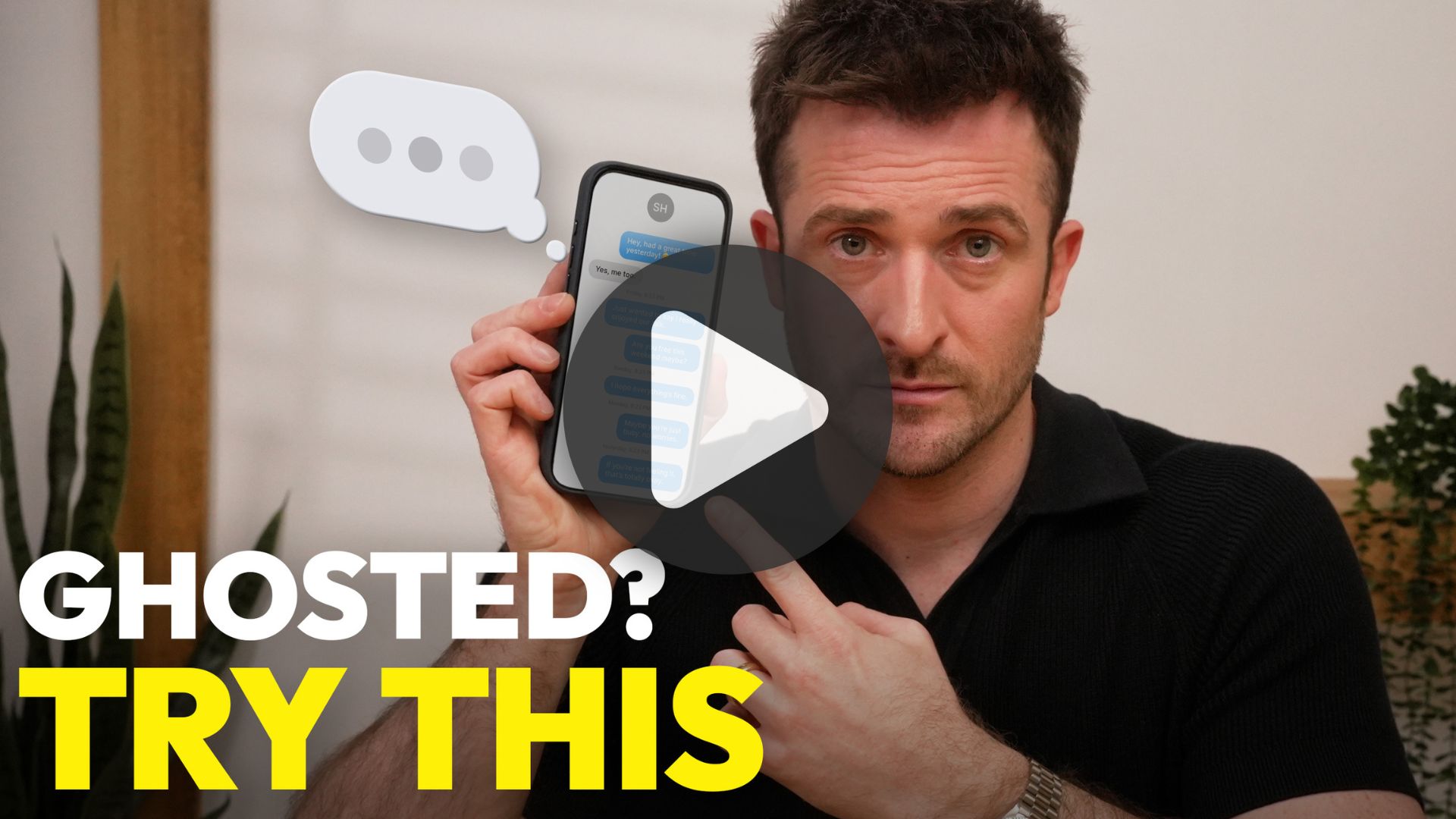
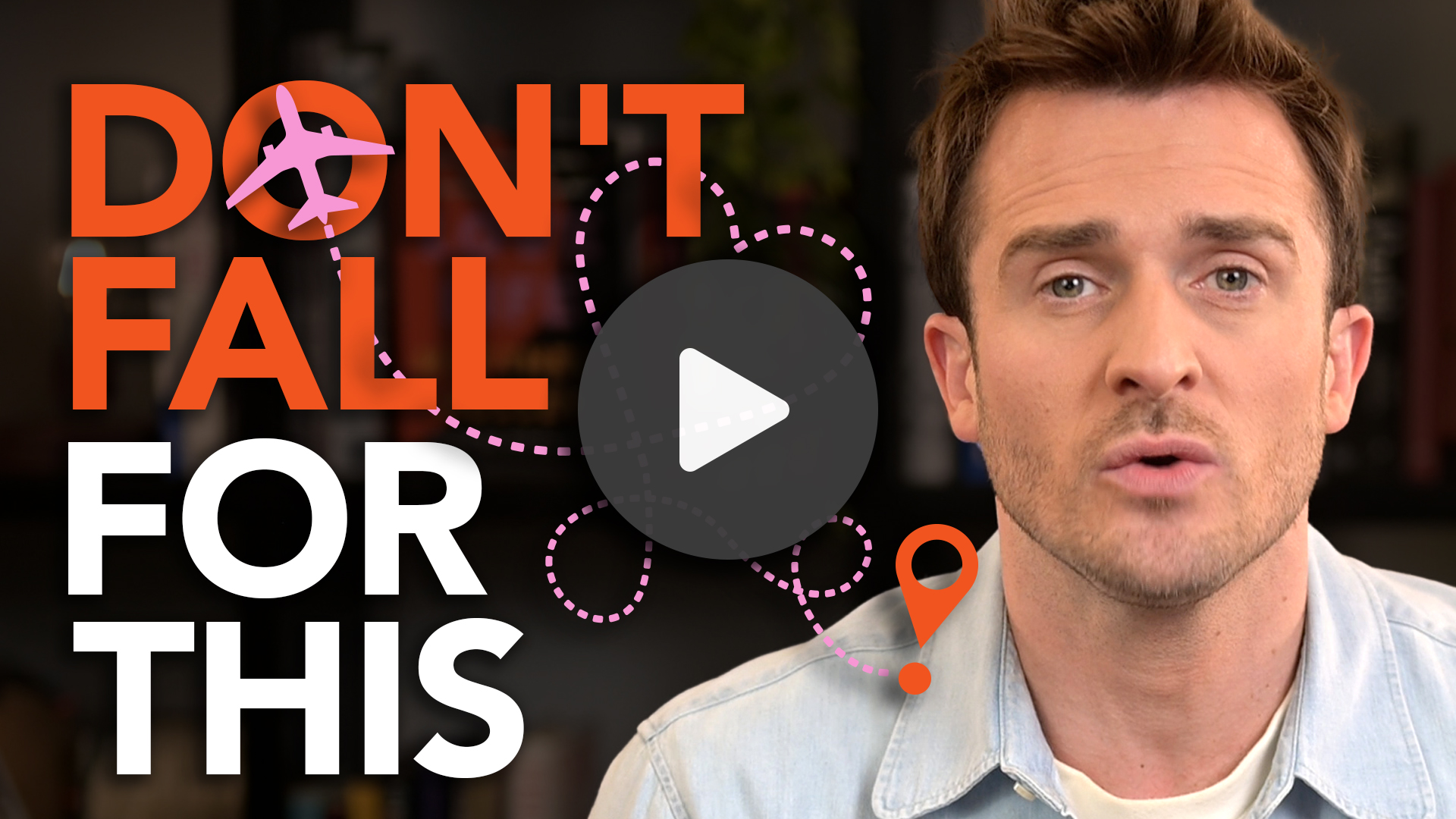


Matthew thanks for the reality check. I did it once and now again. Serious lack of men in my area. Now fallen for ph D who is so much like me, good heart, etc, but lives 5 hours away. He stated plainly not really wanting to date but we talked every day for 5 months. Then we finally met. Now I like him even more but I know he doesn’t feel the same. We are still friends. I’m beginning to believe as I’m crying writing this, I’ll never find someone. I’ll be 64 this October.
Gracias por el contenido. Realmente, sigo a muchos coaches y destaco tu claridad y simpleza para ayudarnos a mejorar en nuestras relaciones.
Thank you for the feedback on how to reframe when we create a story in our minds of someone, and it does hurt like hell when he doesn’t feel the same. I’m struggling with this exact thing. Perhaps once in a few years I’ll find someone I really like, and we had some mutual interest, until he became distant. I have a huge imagination, am a romantic and realize I’ve been envisioning a version of him that I don’t even know. We still have contact and I’m having great difficulty with heartache, depression and anxiety because I’m not getting the same energy back from him. I can see how ridiculous it is, but I can’t seem to move on from this silly story on my head. I can see how ridiculous I am, but my heard won’t listen to my head. We live in separate countries also, I feel so so stupid honestly, and that it’s affected me so badly.
I was just introduced to a man in another city. Think airplane distance. Our conversations have been wonderful, flirtatious but also serious. We have our faith in common which is a priority for me, and for him too. We have only exchanged photos but plan to meet in 3 weeks. Way out of my comfort zone but I believe the potential for relationship is worth the risk.
Dear Mathew,
I was is a relationship whereby he drove 250km one way to visit me, however, he became anxious to solidify our relationship by wanting to move in! Big mistake! I never allowed him to but he simply tried to visit for longer periods of time. It became an uncomfortable situation. Later, I came to find out he had a house but it was dilapidated from neglect! Women need to stay alert to red flags such as a sense of urgency in a relationship that can easily be mistaken for desire! Long distance relationships are somewhat dangerous because they can mask vital information about a person’s reality. Unfortunately, I fell for the guy and spent 7 years on a roller coaster of highs and deep lows! He ended up saying he was going to claim common law and go after the equity in my apartment, without giving any monetary investment on his part! True story! My question is how can I, after experiencing such calamities in a relationship, reasonably trust anyone?
How can I convince my new partner not to take personally my teenage daughters’ rudeness?
I research a man’s background before I would ever date them. I find out where they lived so I can check the court records in that county and state. I believe by doing this I have kept myself safe from dating men that have clearly NOT treated other women well. I don’t want to be their next victim. Looking for love does not mean casting all caution to the wind. Be cautious and keep yourself safe ladies.
Hi Matthew and Audrey !
I’ve met a guy from another country. First we’ve been talking for about 4 months everyday. He finally came to my country and we met each other. Spent all days together and travel. He returned back and hardly ever communicate. So, I asked him if he is willing to know me better, because I want to do so with him. Never replied that. And it was a simple and straight question. Instead he send me messages from time to time, or a photo. I really would like to talk with him and find out what is in his mind. But, he seems like not being reachable. I know he likes me, but also know that I can’t have a long distance relation if he doesn’t communicate with me and doesn’t put the same energy. I wish he could be honestly open and talk with me.
I’m 58 and I have just left a 2 and a half year long distance relationship. I am heartbroken having blown up the relationship with the man I love but also realising that we were not moving forward or resolving the issues that were causing conflict. My daughter is 23. We are both reading Love Life and we can both relate to the principles in the book despite our age difference. Thank you
I would love to hear more about sabotaging a good relationship. I am finally dating a great guy but every time we have a disagreement, I get anxious like the relationship has ended. Then I spiral being ready to stop talking to him or I think of all the little nuances that annoy me with him and that I should end it first. Then he calls me later that day or the next like everything is fine, no drama. He has been upfront that he wants a future with me so I know it is an insecurity in myself. I know this stems from my past relationship as disagreements with my ex were incredibly toxic. I do meditation or watch your videos during these times which help calm my crazy/anxious thoughts. But I am afraid I’ll end it with him over something so silly. What other ideas would you recommend to help re-wire the brain that disagreements are normal and to not let past relationship trauma ruin a new good relationship?
loved the public debate on who is more Tidy!! So funny but so relatable.
Ok so I love a sparkling clean bathroom where in an emergency one can sleep in even ! Would hate any mess in it. So perhaps you clean up coz that personal space is important? And Audrey is more the common /public space clean freak ?? And wants a generally neat living space ?
Matthew your book and advice have become the lifesaver that keeps my head above water. Married for 43 years, I’m now a widow at 70. I had what I thought was a long distance, virtual relationship for over a year. Come to find out, he’s engaged to someone 30 years younger and told her I was the same age as his mother and would embarrass him with the family. I’m reading, meditating and trying not to be utterly depressed at men’s behavior.
Giao diện của Pbv88 được tối ưu cho cả người mới lẫn người chơi lâu năm. Mọi thao tác như nạp tiền, rút tiền hay đặt cược đều đơn giản, nhanh chóng và không mất thời gian.